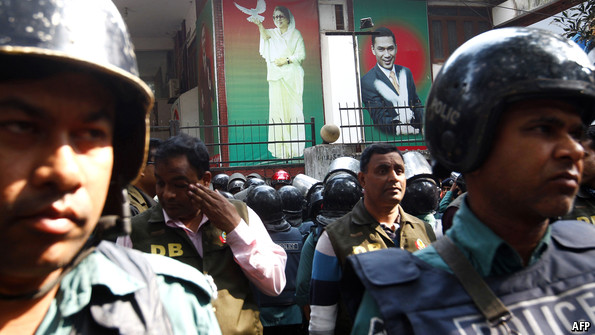
Elsewhere in Dhaka, police arrested Fakhrul Islam Alamgir, the BNP’s secretary-general. Most of the rest of the BNP leadership are in hiding. The government ordered police to lock down party headquarters. The owner of a television channel was arrested (and charged with a pornography offence) after it broadcast a speech calling for the government’s overthrow by Tarique Rahman, Mrs Zia’s son, who is in self-imposed exile in London.
Mahfuz Anam, editor of the Daily Star newspaper and no fan of the BNP or Mrs Zia, condemned the “mindless suppression of the opposition, which is making a mockery of our claim to be a democratic country”. The BNP, weak and long waiting for an opportunity to remind its own members and the rest of the country of its existence, had planned to mark the anniversary as “Democracy Killing Day”.
The League and its leader, Sheikh Hasina, the prime minister, had other plans. It suspended long-distance bus services, banned gatherings and celebrated the day as a “Constitution and Democracy Protection Day”, though the election it marked was a farce—and not just because of the BNP boycott. The leader of the third-largest party, Mohammad Ershad, a former dictator, spent polling day detained in an army hospital; the fourth-largest party was barred from running because of its explicitly Islamic charter.
As always, it is ordinary people, especially in rural Bangladesh, who pay the price for the renewed feuding of Dhaka’s drama-prone politicians. After ruling-party activists shot dead two BNP workers in the northern district of Natore, the BNP called an indefinite transport strike. Seven people have now been killed and hundreds injured in clashes across the country.
Sheikh Hasina’s legitimacy is being questioned. She came back to power in a landslide election win in December 2008, but has used that mandate to hound the opposition, amend the constitution to suit her, and undermine democracy—just as Mrs Zia had done in office, most recently from 2001 to 2006. The League’s claims of economic competence are beginning to look irrelevant. The arbitrary suspension of rights and humiliation of Mrs Zia are alienating neutral voters. Mr Ershad’s Jatiya Party, now a League ally (as well, bizarrely, as the formal parliamentary opposition), has said its ministers might quit the cabinet.
The prime minister seems determined to destroy the BNP as a political force before the next election, due in 2019. Her government controls the courts, the security apparatus and the press. It is not interested in compromise and confident it can hang on for four years. So the BNP’s only chance of a change seems to lie with the army, if it felt it had to intervene after a breakdown in public order. But the armed forces have refused to be drawn in. They are kept happy by lucrative UN peacekeeping operations and business deals.
This week’s events mark the start of another cycle of violence. The word in Dhaka is that the government is preparing to arrest Mrs Zia, possibly on charges of sedition. Meanwhile, she is already on trial for corruption. If convicted she could face time in jail. Possible executions of senior opposition figures sentenced by a war-crimes court for their role in Bangladesh’s war of independence from Pakistan in 1971 may threaten stability further.
Nor does it seem likely that other countries can influence Bangladesh’s internal politics. Unusually, China, which is increasingly batting for the BNP, has called for dialogue. But America has stopped putting public pressure on the Bangladeshi government. Germany, a big importer of Bangladeshi garments, does not, for now, even have an ambassador in Dhaka. Nor has India’s new government shown any sign of lessening its support for Sheikh Hasina. She thus faces little pressure to compromise, and this week’s confrontation may foreshadow many more. The sand lorries and locksmiths will be busy.
Source: The Economist
